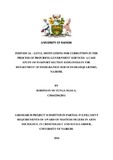| dc.description.abstract | This research project comprehends and analyses the individual-level motivations for corruption in the process of providing government services in an urban public offices setting in Kenya. The project employed survey approach through ―self reporting and hypothetical choices‖ derived from experience and understanding of the service providers. This research project seeks to make contribution by presenting for a data and analysis to criminology and study of corruption that is individually focused and practicable. The main focus is the key individual-level motivations for corruption specifically definitions, habitus, dispositions and predispositions. The research project defends the argument that corruption is ultimately the direct result of decisions, choices and behaviour at the level of an individual. For public officials the decision to engage in corrupt behaviour is primarily influenced by a personal definition of corruption, individual perceptions of how widespread corrupt activities are (imitation), belonging to a certain habitus and having certain dispositions and predispositions. Thus apart from devoting a lot of energy to explaining structural features in the level of perceived corruption which provides less effective remedy for corruption in public sector understanding individual-level motivations for corruption could provide more practical and effective way of dealing with corruption in public sector in Kenya. The research data analysis shows that petty corruption is practised in forms of extortion, straddling, influence peddling and kinship/nepotism. It also found that the specific individual-level motivations for corruption that makes public officials more prone to corrupt behaviour than others are positive or favourable definition, positive/favourable attitude, wide engagement, approvals, positive work lifestyle, values, expectations and extraordinary dispositions. In addition the study shows that corruption control and prevention in the section is moderate effective but more needs to be done especially on individual level motivations for corruption. The study recommends equal efforts should be both to reform the structures/institutions and as well as individuals‘interpretations, perceptions and dispositions towards corruption. Therefore a pragmatic approach is needed to curb corruption in Kenya | en_US |

